虚拟语气及倒装Word版
- 格式:doc
- 大小:55.50 KB
- 文档页数:7
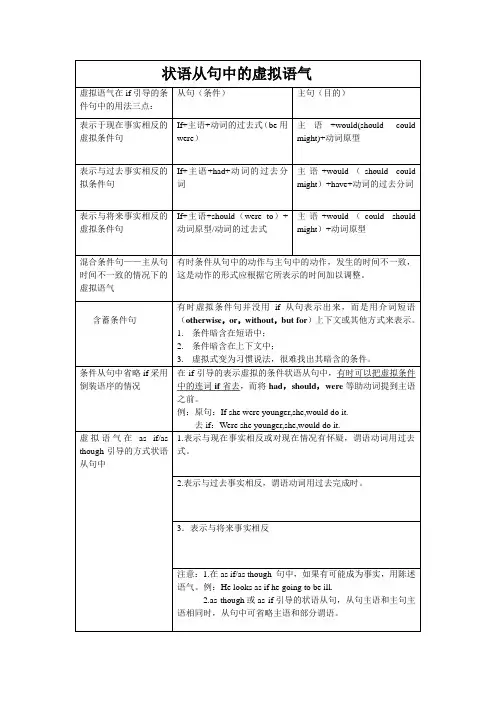
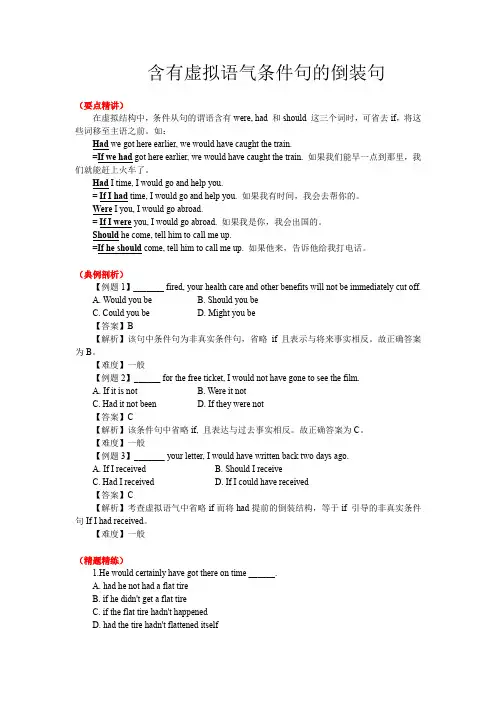
含有虚拟语气条件句的倒装句(要点精讲)在虚拟结构中,条件从句的谓语含有were, had 和should 这三个词时,可省去if,将这些词移至主语之前。
如:Had we got here earlier, we would have caught the train.=If we had got here earlier, we would have caught the train. 如果我们能早一点到那里,我们就能赶上火车了。
Had I time, I would go and help you.= If I had time, I would go and help you. 如果我有时间,我会去帮你的。
Were I you, I would go abroad.= If I were you, I would go abroad. 如果我是你,我会出国的。
Should he come, tell him to call me up.=If he should come, tell him to call me up. 如果他来,告诉他给我打电话。
(典例剖析)【例题1】_______ fired, your health care and other benefits will not be immediately cut off.A. Would you beB. Should you beC. Could you beD. Might you be【答案】B【解析】该句中条件句为非真实条件句,省略if且表示与将来事实相反。
故正确答案为B。
【难度】一般【例题2】______ for the free ticket, I would not have gone to see the film.A. If it is notB. Were it notC. Had it not beenD. If they were not【答案】C【解析】该条件句中省略if, 且表达与过去事实相反。
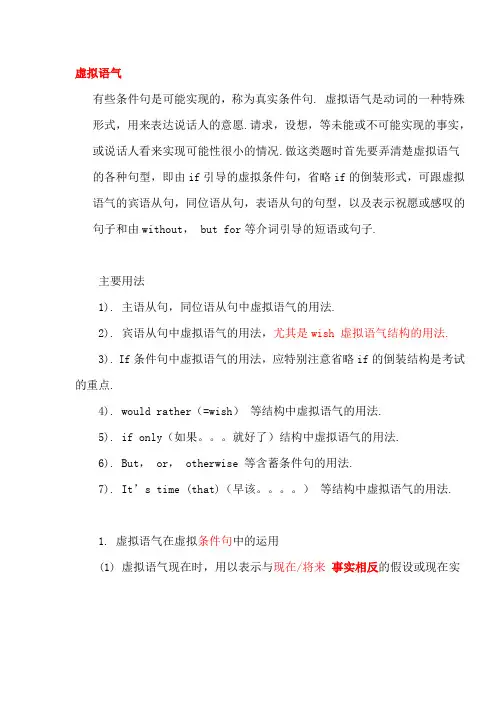
虚拟语气有些条件句是可能实现的,称为真实条件句. 虚拟语气是动词的一种特殊形式,用来表达说话人的意愿.请求,设想,等未能或不可能实现的事实,或说话人看来实现可能性很小的情况.做这类题时首先要弄清楚虚拟语气的各种句型,即由if引导的虚拟条件句,省略if的倒装形式,可跟虚拟语气的宾语从句,同位语从句,表语从句的句型,以及表示祝愿或感叹的句子和由without, but for等介词引导的短语或句子.主要用法1). 主语从句,同位语从句中虚拟语气的用法.2). 宾语从句中虚拟语气的用法,尤其是wish 虚拟语气结构的用法.3). If条件句中虚拟语气的用法,应特别注意省略if的倒装结构是考试的重点.4). would rather(=wish)等结构中虚拟语气的用法.5). if only(如果。
就好了)结构中虚拟语气的用法.6). But, or, otherwise 等含蓄条件句的用法.7). It’s time (that)(早该。
)等结构中虚拟语气的用法.1. 虚拟语气在虚拟条件句中的运用(1) 虚拟语气现在时,用以表示与现在/将来事实相反的假设或现在实现可能性不大的情况.Eg. If I were a bird, I would fly to you.If it is not for their help, we shall be in a very difficult position.If it were not for their help, we should be in a very difficult position.If I had seen the film, I would…..(2) 虚拟语气过去式. 表示与过去事实完全相反的假设.Eg. If we had started earlier, we should not have missed the train.If she hadn’t been ill, she might have come.If she were not ill, she might come.◆书面语中,如果从句里含有should, had, were或其他助动词,则可将从属连词if省去,将助动词.情态动词.be或have放在句首形成部分倒装.Eg.Were he in your position,he’d do the same.If he Were in your position,he’d do the same.Had I had time, I would have done that yesterday.If I Had had time, I would have done that yesterday.If he Should (万一)come tomorrow, I should give him the dictionary.(3) 虚拟语气在某些从句中的应用.A)在(表现了说话人的愿望)wish, suggest, order, demand, propose,command, request, recommend, require, decide, insist, desire,urge等动词的宾语从句(should:应该) + 动词原形.以及would rather /sooner that后要用“ (should:应该) + 动词原形” 来表示愿望,建议,命令,要求等;由上述动词派生或转化的名词suggestion, proposal, plan,motion, recommendation, demand, order, desire, request,requirement, insistence, advice, decision , obligatory(义不容辞的,必须的同位语从句或表语从句中也要用相应的虚拟形式.Eg. His suggestion was that we (should) go at once.Wang insisted that we go at once.B)在It is/was + 某些形容词 + that (表现了说话人的愿望)从句的句型中,that从句中的谓语动词常用虚拟语气,即“should + 动词原形”这些形容词有:important, necessary, essential, imperative, natural, strange,advisable, desirable, possible, probable, astonishing,surprising, desired, suggested, requested, recommended,ordered, proposed, decided, moved等.C) “ should(居然/竟然) + 动词原形(或完成形式)” 可表示惊奇,遗憾,怀疑,不满等.ⅰ. 用于expect, believe, think, suspect 等动词的否定或疑问形式后的宾语从句中.Eg. I never expected that the new apartment should be so small.ⅱ. 用于“It is a pity, it is a shame, it is no wonder 等+ that”等结构后的主语从句中.Eg. It is a pity that he should be so careless.D) 在由for fear that, in case, lest 等引导的状语从句中,用“ should (万一)+ 动词原形” 表示“惟恐”的意思.Eg. He handled the instrument with care for fear that it should be damaged.E) 在“ It is (about/ high ) time + that (从句)(早就应该)” 中,谓语动词常用过去式表表示虚拟语气.Eg. It is high time that Chinese people learnt English.F) 在“as if/ as though”(似乎/好像) 引导的状语从句中,谓语动词与wish的宾语从句的虚拟形式相同.Eg. He w ork s with such enthusiasm as if he never knew fatigue. He speaks English as though he were an American.G) 在 look/sound/feel/ seem + as if / as though从句中,当表示真实情况时,用陈述语气; 否则,用虚拟语气.Eg.It seems as if they know each other. (真实情况)It seems as if they knew each other.It seems as though it were already spring. (虚拟语气)H) 用在if only(如果。
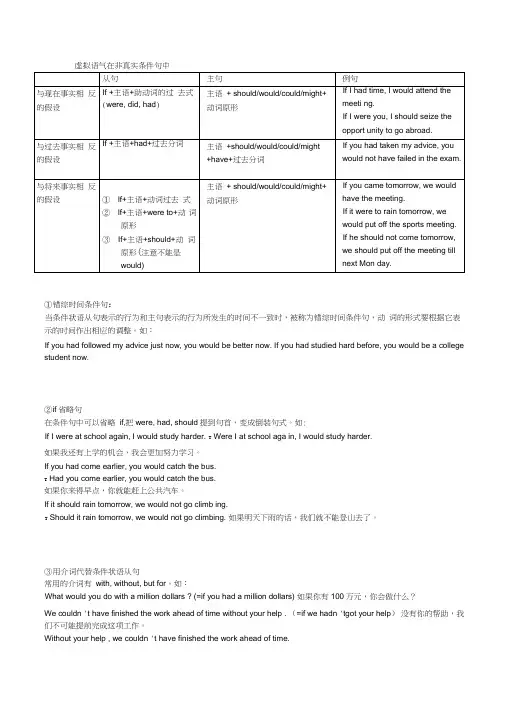
①错综时间条件句:当条件状语从句表示的行为和主句表示的行为所发生的时间不一致时,被称为错综时间条件句,动词的形式要根据它表示的时间作出相应的调整。
如:If you had followed my advice just now, you would be better now. If you had studied hard before, you would be a college student now.②i f省略句在条件句中可以省略if,把were, had, should提到句首,变成倒装句式。
如:If I were at school again, I would study harder. T Were I at school aga in, I would study harder.如果我还有上学的机会,我会更加努力学习。
If you had come earlier, you would catch the bus.T Had you come earlier, you would catch the bus.如果你来得早点,你就能赶上公共汽车。
If it should rain tomorrow, we would not go climb ing.T Should it rain tomorrow, we would not go climbing. 如果明天下雨的话,我们就不能登山去了。
③用介词代替条件状语从句常用的介词有with, without, but for。
如:What would you do with a million dollars ? (=if you had a million dollars) 如果你有100万元,你会做什么?We couldn 't have finished the work ahead of time without your help . (=if we hadn 'tgot your help)没有你的帮助,我们不可能提前完成这项工作。
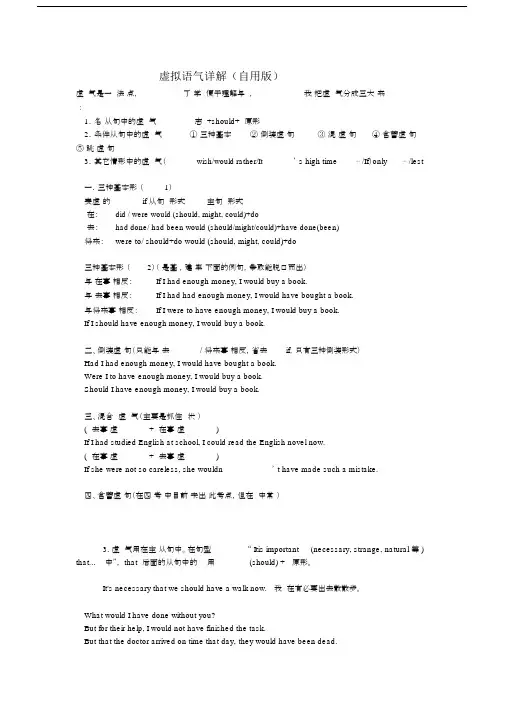
虚拟语气详解(自用版)虚气是一法点,了学便于理解与,我把虚气分成三大来:1.名从句中的虚气志 +should+原形2.条件从句中的虚气① 三种基本② 倒装虚句③ 混虚句④ 含蓄虚句⑤ 跳虚句3.其它情形中的虚气(wish/would rather/It’ s high time⋯ /If)only⋯ /lest一.三种基本形(1)表虚的if 从句形式主句形式在:did / were would (should, might, could)+do去:had done/ had been would (should/might/could)+have done(been)将来:were to/ should+do would (should, might, could)+do三种基本形(2)(是基,建牢下面的例句,争取能脱口而出)与在事相反:If I had enough money, I would buy a book.与去事相反:If I had had enough money, I would have bought a book.与将来事相反:If I were to have enough money, I would buy a book.If I should have enough money, I would buy a book.二、倒装虚句(只能与去/ 将来事相反,省去if,只有三种倒装形式)Had I had enough money, I would have bought a book.Were I to have enough money, I would buy a book.Should I have enough money, I would buy a book.三、混合虚气(主要是抓住状)(去事虚+在事虚)If I had studied English at school, I could read the English novel now.(在事虚+去事虚)If she were not so careless, she wouldn’ t have made such a mistake.四、含蓄虚句(在四考中目前未出此考点,但在中常)that...3. 虚气用在主从句中。
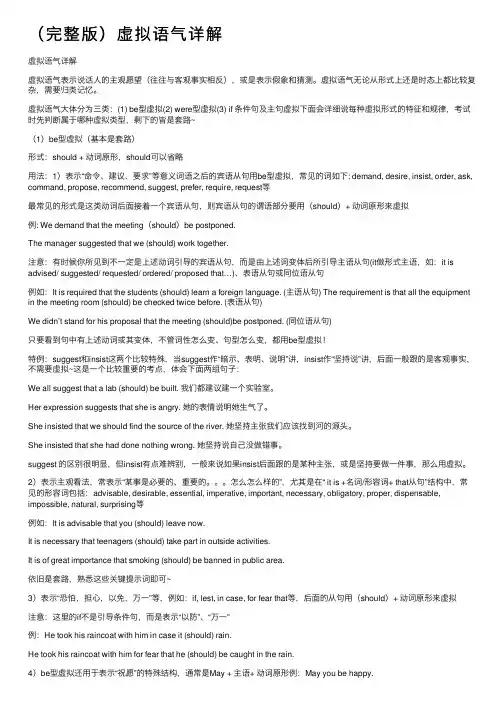
(完整版)虚拟语⽓详解虚拟语⽓详解虚拟语⽓表⽰说话⼈的主观愿望(往往与客观事实相反),或是表⽰假象和猜测。
虚拟语⽓⽆论从形式上还是时态上都⽐较复杂,需要归类记忆。
虚拟语⽓⼤体分为三类:(1) be型虚拟(2) were型虚拟(3) if 条件句及主句虚拟下⾯会详细说每种虚拟形式的特征和规律,考试时先判断属于哪种虚拟类型,剩下的皆是套路~(1)be型虚拟(基本是套路)形式:should + 动词原形,should可以省略⽤法:1)表⽰“命令、建议、要求”等意义词语之后的宾语从句⽤be型虚拟,常见的词如下: demand, desire, insist, order, ask, command, propose, recommend, suggest, prefer, require, request等最常见的形式是这类动词后⾯接着⼀个宾语从句,则宾语从句的谓语部分要⽤(should)+ 动词原形来虚拟例: We demand that the meeting(should)be postponed.The manager suggested that we (should) work together.注意:有时候你所见到不⼀定是上述动词引导的宾语从句,⽽是由上述词变体后所引导主语从句(it做形式主语,如:it is advised/ suggested/ requested/ ordered/ proposed that…)、表语从句或同位语从句例如:It is required that the students (should) learn a foreign language. (主语从句) The requirement is that all the equipment in the meeting room (should) be checked twice before. (表语从句)We didn’t stand for his proposal that the meeting (should)be postponed. (同位语从句)只要看到句中有上述动词或其变体,不管词性怎么变、句型怎么变,都⽤be型虚拟!特例:suggest和insist这两个⽐较特殊,当suggest作“暗⽰、表明、说明”讲,insist作“坚持说”讲,后⾯⼀般跟的是客观事实,不需要虚拟~这是⼀个⽐较重要的考点,体会下⾯两组句⼦:We all suggest that a lab (should) be built. 我们都建议建⼀个实验室。
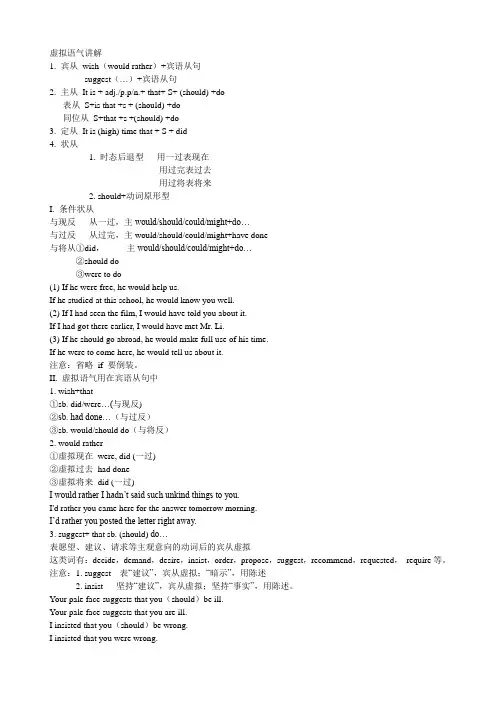
虚拟语气讲解1. 宾从wish(would rather)+宾语从句suggest(…)+宾语从句2. 主从It is + adj./p.p/n.+ that+ S+ (should) +do表从S+is that +s + (should) +do同位从S+that +s +(should) +do3. 定从It is (high) time that + S + did4. 状从1. 时态后退型用一过表现在用过完表过去用过将表将来2. should+动词原形型I. 条件状从与现反从一过,主would/should/could/might+do…与过反从过完,主would/should/could/might+have done与将从①did,主would/should/could/might+do…②should do③were to do(1) If he were free, he would help us.If he studied at this school, he would know you well.(2) If I had seen the film, I would have told you about it.If I had got there earlier, I would have met Mr. Li.(3) If he should go abroad, he would make full use of his time.If he were to come here, he would tell us about it.注意:省略if 要倒装。
II. 虚拟语气用在宾语从句中1. wish+that①sb. did/were…(与现反)②sb. had done…(与过反)③sb. would/should do(与将反)2. would rather①虚拟现在were, did (一过)②虚拟过去had done③虚拟将来did (一过)I would rather I hadn’t said such unkind things to you.I'd rather you came here for the answer tomorrow morning.I’d rather you posted the letter right away.3. suggest+ that sb. (should) do…表愿望、建议、请求等主观意向的动词后的宾从虚拟这类词有:decide,demand,desire,insist,order,propose,suggest,recommend,requested,require等。
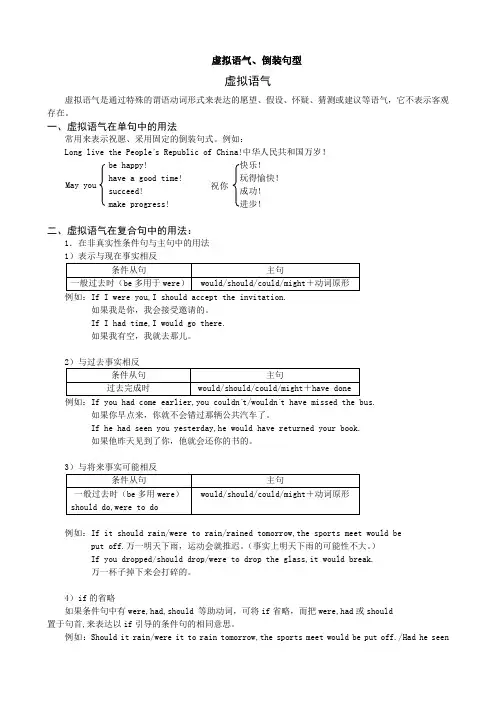
虚拟语气、倒装句型虚拟语气虚拟语气是通过特殊的谓语动词形式来表达的愿望、假设、怀疑、猜测或建议等语气,它不表示客观存在。
一、虚拟语气在单句中的用法常用来表示祝愿、采用固定的倒装句式。
例如:Long live the People ⨯s Republic of China!中华人民共和国万岁!be happy! 快乐!have a good time! 玩得愉快! succeed! 成功!make progress! 进步!二、虚拟语气在复合句中的用法:1. 在非真实性条件句与主句中的用法1) 表示与现在事实相反如果我是你,我会接受邀请的。
If I had time,I would go there.如果我有空,我就去那儿。
2) 与过去事实相反例如:If you had come earlier,you couldn ⨯t/wouldn ⨯t have missed the bus.如果你早点来,你就不会错过那辆公共汽车了。
If he had seen you yesterday,he would have returned your book.如果他昨天见到了你,他就会还你的书的。
3) 与将来事实可能相反例如:If it should rain/were to rain/rained tomorrow,the sports meet would be put off.万一明天下雨,运动会就推迟。
(事实上明天下雨的可能性不大。
)If you dropped/should drop/were to drop the glass,it would break.万一杯子掉下来会打碎的。
4) i f 的省略如果条件句中有were,had,should 等助动词,可将if 省略,而把were,had 或should置于句首,来表达以if 引导的条件句的相同意思。
例如:Should it rain/were it to rain tomorrow,the sports meet would be put off./Had he seen May you 祝你you yesterday,he would have returned your book.5)条件句或主句的省略当有上下文或上下句中的语言环境暗示的时候,表示虚拟语气的从句或主句往往可以省略,以避免重复。
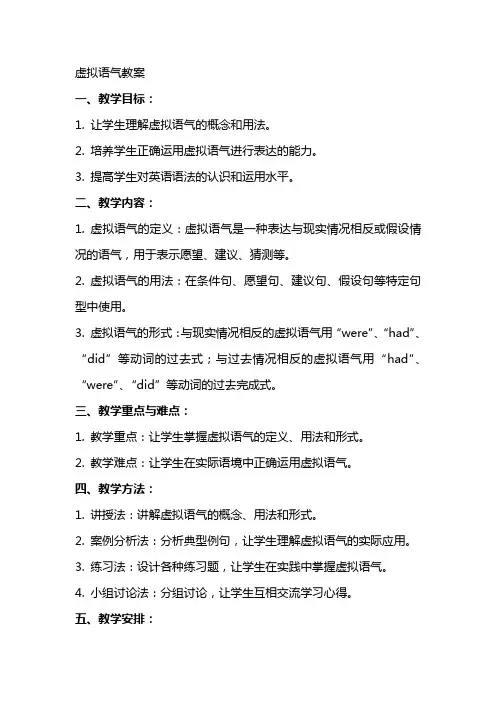
虚拟语气教案一、教学目标:1. 让学生理解虚拟语气的概念和用法。
2. 培养学生正确运用虚拟语气进行表达的能力。
3. 提高学生对英语语法的认识和运用水平。
二、教学内容:1. 虚拟语气的定义:虚拟语气是一种表达与现实情况相反或假设情况的语气,用于表示愿望、建议、猜测等。
2. 虚拟语气的用法:在条件句、愿望句、建议句、假设句等特定句型中使用。
3. 虚拟语气的形式:与现实情况相反的虚拟语气用“were”、“had”、“did”等动词的过去式;与过去情况相反的虚拟语气用“had”、“were”、“did”等动词的过去完成式。
三、教学重点与难点:1. 教学重点:让学生掌握虚拟语气的定义、用法和形式。
2. 教学难点:让学生在实际语境中正确运用虚拟语气。
四、教学方法:1. 讲授法:讲解虚拟语气的概念、用法和形式。
2. 案例分析法:分析典型例句,让学生理解虚拟语气的实际应用。
3. 练习法:设计各种练习题,让学生在实践中掌握虚拟语气。
4. 小组讨论法:分组讨论,让学生互相交流学习心得。
五、教学安排:1. 第一课时:介绍虚拟语气的概念和用法。
2. 第二课时:讲解虚拟语气的形式。
3. 第三课时:分析典型例句,让学生理解虚拟语气的实际应用。
4. 第四课时:设计练习题,让学生在实践中掌握虚拟语气。
5. 第五课时:小组讨论,学生互相交流学习心得。
六、教学评价:1. 课堂参与度:观察学生在课堂上的积极参与程度,以及对虚拟语气知识的理解和运用。
2. 练习完成情况:检查学生完成练习题的情况,评估他们对虚拟语气的掌握程度。
3. 小组讨论:评价学生在小组讨论中的表现,以及对虚拟语气的运用和交流能力。
七、教学准备工作:1. 准备教案、PPT和教学素材。
2. 设计练习题和案例分析题。
3. 准备小组讨论的话题和问题。
八、教学过程:1. 引入新课:通过一个与虚拟语气相关的谜语或故事,引发学生的兴趣。
2. 讲解虚拟语气的概念和用法:使用PPT展示虚拟语气的定义和用法。
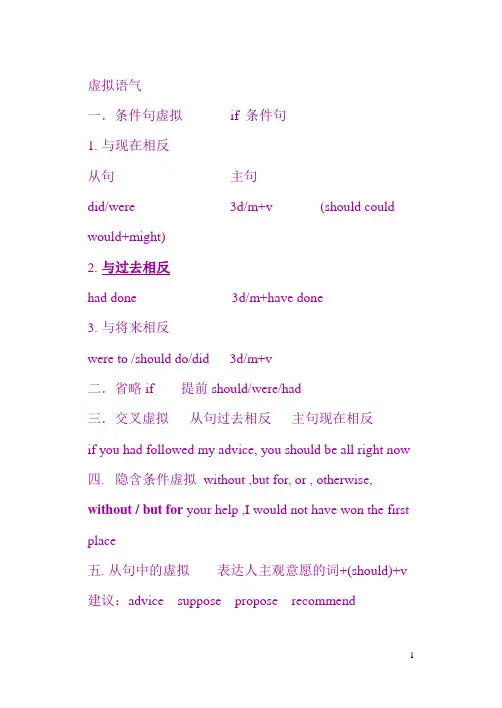
虚拟语气一.条件句虚拟if 条件句1.与现在相反从句主句did/were 3d/m+v (should could would+might)2.与过去相反had done 3d/m+have done3.与将来相反were to /should do/did 3d/m+v二.省略if 提前should/were/had三.交叉虚拟从句过去相反主句现在相反if you had followed my advice, you should be all right now 四.隐含条件虚拟without ,but for, or , otherwise, without / but for your help ,I would not have won the first place五.从句中的虚拟表达人主观意愿的词+(should)+v 建议:advice suppose propose recommend要求:require request demand命令:order安排:arrangeI suggest he (should )get up earlymy suggestion is that...should +doIt is suggested...should +do六.其他虚拟wish / if only / would rather 用过去时表示与现在或将来相反用过去完成时表示与过去相反I would rather that he did not say anythingIt is about / high time that you went to school If only I had followed your advice倒装全倒谓语+ 主语1.表示地点的短语放在句首across the street, stands a tall building among the gates , stands Mary2.表示地点时间方位的副词在句首in out here there awayhere comes the car半倒半倒条件+助动词+主语+ 动词半倒条件+ be + 主语+ 其他1.only +状语放在句首only by taking effective steps, can we solve the issue only then did i realize the importance of English2.表示否定意义的副词放在句首no , not only ,not until ,by no means ,hardly , seldom,littleLittle do we know about himNever have I been to the Great WallNot until he came back did i know about itNo sooner had he got home than he began to prepare supperNeither have i gone abroad ,nor will i have a chance in future3 so,neither, nor +助动词+主语表示也........... so do I neither do i。

虚假语气( Subjunctive Mood)1.if (条件状从句)与在事相反与去事相反与未来事相反条件句条件从句中省略 if 采纳倒装序的状况委宛条件从句(省略 if ,用其余取代)从句( if)主句形式例句would/could/If I were you,I should did/were should/might study English.+dowould/could/If you had taken my had done should/might advice,you wouldn’t+have done have failed in the exam.①did would/could/If it were to rain②should do should/might tomorrow, the meeting③were to do+do would be put off.主、从句时间不一致,动词形式要依据它所表示的时间来调整。
eg. : If I had worked hard at school,I would be an engineer,too.“ were,had,should +主语”放句首(否定词not 不可以放前方)。
eg.: ①Were I in school again,I would work harder.②H ad you been here earlier,you would have seen him.③S hould there be a meeting tomorrow,I would come.注意: Were it not for the expense,I would go to Italy.(√)Weren’ t it for the expense,I would go to Italy.(×)常用词:①介词:with,without,but for(要不是,假如没有);②连词: or,but;③副词:otherwise.eg.: ①Without air, there would be no living things.②But for your help,I couldn ’ t have finished it in advance.③I was ill that day.Otherwise,I would had taken part in the sports meeting.=If I hadn’ t been ill that day,I would had...2. wish (从句) /if only( 假如⋯⋯就好了)从句形式与在事相反did/were 与去事相反had done例句①I wish it were spring all the year round.②If only I were a bird!①Jack drove fast and was in an accident. Hesaid, “ I wish I had driven more carefully!” .②If only I had taken his advice.would/could/I wish you could go with us tomorrow.与未来事相反might do3.would rather +从句(表示宁愿某人在此刻或未来要做某事或过去做过某事)从句形式例句与在或未来事相反did/were I would rather you came tomorrow.与去事相反had done I ’ d rather you hadn ’ t been present.4. as if/as though,even if/though+ 从句从句谓语形式例句与此刻事实相反did/were He looked as if he were an artist.与过去事实相反had done He talked about the Great Wall as if he had been there before.与未来事实相反would/could/He opened his mouth as if he would say might do something.注意: 1. 在 as if/as though句中,假如有可能成为事实,用陈说语气。
高中英语语法讲解--虚拟语气1. 语气的定义和种类(1)语气的定义语气是动词的一种形式,它表示说话人对某一行为或事情的看法和态度。
(2)语气的种类A. 陈述语气表示动作或状态是现实的、确定的或符合事实的,用于陈述句、疑问句和某些感叹句。
We are not ready.Did it rain all day yesterday?What a fine day today!B. 祈使语气表使说话人的建议、请求、邀请、命令等。
Be careful.Don’t forget to clo se the window.Open the door, please.C. 虚拟语气表使动作或状态不是客观存在的事实,而是说话人的主观愿望、假设或推测等。
2. 虚拟语气一. 虚拟语气在条件句中的应用学习虚拟语气在条件句中的用法之前我们必须清楚条件句的种类:条件句有真实条件句与非真实条件句(或称虚拟条件句)两种。
真实条件句所表的假设是可能发生或实现的,句中的条件从句与结果主句都用陈述语气。
如:If it doesn’t rain tomorrow, I will go for a picnic. 假若明天不下雨,我就去野餐。
Oil floats if you pour it on water. 你如把油倒在水里,油就浮起来。
虚拟条件句所表的假设则是不可能或不大可能发生或实现的,句中的条件从句与结果主句皆须用虚拟语气。
条件从句主句与现在事实相违背过去式(动词是be用were)should / would/could/might + 动词原形与过去事实相违背had + 过去分词should / would/could/might + have +过去分词与未来事实相违背1) should + 动词原形2) were + 动词不定式3) 过去式(动词是Be也可以用were)should / would/could/might + 动词原形1. 与现在事实相反的虚拟条件句,条件从句的谓语用动词的过去式(be的过去式用were), 主句的谓语用should (would, might,could)+动词原形。
Part One 虚拟语气(Subjunctive Mood)表示与事实相反的假设或将来不太可能实现的愿望。
使用场合:1.1)与过去事实相反:would / should / could / might + have done if…had doneI would have passed the English exam if you had helped me.2) 与现在事实相反:would / should / could / might + v if…v-ed (但be的过去式通常用were)What would you do if you were me?3) 与将来事实相反:would / should / could / might + v if…were to + v 或should + vWe would hold a party if you were to arrive tomorrow.*主句中的should通常用于第一人称,从句中的should各人称通用。
*在if引导的虚拟条件从句中可以把if省略,并将had, should或were提到句首。
如:a. I would have passed the English exam if you had helped me. =I would have passed the English exam had you helped me.b. What would you do if you were me? =What would you do were you me?c. We would hold a party if you were to arrive tomorrow. =We would hold a party were you to arrive tomorrow.*如果从句和主句中的时间不一致,则要分别使用相对应的动词形式。
虚拟语气英语中的各种语气:1、陈述语气:I like apples 我喜欢苹果。
I don't like apples2、疑问语气:What's your name?Do you like apples?3、祈使语气:Open the door4、虚拟语气:If I were you, I would forgive her如果我是你,我将会原谅她。
1、与现在的事实相反:从句用过去式,主句用would/could/might/should/+V原形例如;If I had time, the classroom would be cleaner.如果我有时间,教室将会更加干净。
2、与过去的事实相反:主句用would/could/should/might/+ have done , 从句过去完成时。
例如;If I had finished my homework, I would have passed that test.如果当时我完成了我的作业,我就能够通过我的考试了。
3、与将来的事实相反:主句用:should/could/would/might/+V原形,从句用should do (可能性最大),过去式(可能性一般)were to do (可能性最小)If it should snow tomorrow,I would make a snowman 如果明天下雪,明天我将堆个雪人If it snowed tomorrow,I would make a snowman 如果明天下雪,明天我将堆个雪人If it were to snow tomorrow ,I would make a snowman 如果明天下雪,我将对个雪人虚拟语气的倒装形式If I had worked hard, I would have finished it 如果当时我努力工作,我就已经完成它了。
Had I worked hard, I would have finished itIf it should snow tomorrow, I would make a snowmanShould it snow tomorrow, I would make a snowmanIf it were to snow tomorrow, I would make a snowmanWere it to snow tomorrow ,I would make a snowman虚拟语气在各类从句中的用法1、I lifted the chair so that I could be seen 我举起椅子就是为了能被看见(状语从句)状语从句中常见连接词:as if 好像,as though 好像,in order that 为了,for fear that 生怕,In case 万一。
环球雅思教育学科教师讲义讲义编号: ______________ 副校长/组长签字:签字日期:【考纲说明】虚拟语气和倒装的考察一般出现在单选和完成句子中,需要学会应用基本句型。
【知识梳理】虚拟语气一、语气英语中的语气分为三类:陈述语气(用于陈述句、疑问句、感叹句)祈使语气(用于祈使句)虚拟语气(用于条件状语从句、宾语从句等)二、虚拟语气如果所说的不是事实,而是一种假设、愿望、建议或是一种实现不了的空想,就用虚拟语气。
三、虚拟语气在非真实条件状语从句中的用法1、真实条件状语从句与非真实条件状语从句Eg:If he doesn’t hurry up, he will miss the bus.( 真实条件状语):If I were you, I would go at once.(非真实条件状语从句):If there was no air, people would die.(非真实条件状语从句)2、虚拟语气在非真实条件状语从句中的用法及动词形式①表示与现在事实相反的情况If I were you, I’d take an umbrella.如果我是你,我会带把伞。
If I had any money with me, I could lend you some.如果我带钱了,我就会借给你些。
②表示与过去事实相反的情况Eg:If I had got there earlier, I should/could have met her.如果我早到那儿,我就会见到她。
If he had taken my advice, he would not have made such a mistake.如果他听我的劝告的话,就不会犯这样的错误了。
(事实:没有听我的话)③表示对将来情况的主观推测(可能相反或可能性很小)Eg:If he would come here tomorrow, I should/would talk to him.如果他哪天来这儿的话,我就跟他谈谈。
(事实:来的可能性很小)If there were a heavy snow next Sunday, we would not go skating.如果下周日下大雪,我们就不能去滑冰了.(事实:不知能否下雪)四、虚拟语气的其他用法1、虚拟语气用在wish 后的宾语从句a、表示与现在事实相反的愿望,谓语动词用过去式eg: I wish I had your brains.我希望我有你那样的头脑。
(事实:我根本比不上你)b、表示过去事实相反的愿望,谓语动词:had+v-edeg: I wish I had known the truth of the matter.我希望我原来知道这件事的真相。
c、表示将来难以实现的愿望, 谓语动词:should/would + 动词原形.eg: I wish I should have a chance again.很难再有这样的机会了。
(2、虚拟语气用在suggest(建议)、insist(坚持)、demand(要求)、order(命令)等动词后的宾语从句中,从句的谓语动词都用:“should + 动词原形”或只用“动词原形”。
如 He suggested/ insisted/ordered/demandthat we (should) take the teacher’s advice.倒装一.倒装句之全部倒装全部倒装是只将句子中的谓语动词全部置于主语之前。
此结构通常只用与一般现在时和一般过去时。
常见的结构有:1) here, there, now, then, thus等副词置于句首, 谓语动词常用be, come, go, lie, run。
There goes the bell.Then came the chairman.Here is your letter.2) 表示运动方向的副词或地点状语置于句首,谓语表示运动的动词。
Out rushed a missile from under the bomber.Ahead sat an old woman.注意:上述全部倒装的句型结构的主语必须是名词,如果主语是人称代词则不能完全倒装。
Here he comes. Away they went.二.倒装句之部分倒装部分倒装是指将谓语的一部分如助动词或情态倒装至主语之前。
如果句中的谓语没有助动词或情态动词,则需添加助动词do, does或did,并将其置于主语之前。
1。
句首为否定或半否定的词语,如no, not, never, seldom, little, hardly, at no time, in no way, not until…等。
Never have I seen such a performance.Nowhere will you find the answer to this question.Not until the child fell asleep did the mother leave the room.当Not until引出主从复合句,主句倒装,从句不倒装。
注意:如否定词不在句首不倒装。
I have never seen such a performance.The mother didn't leave the room until the child fell asleep.典型例题1) Why can't I smoke here?At no time___ in the meeting-roomA. is smoking permittedB. smoking is permittedC. smoking is it permittedD. does smoking permit2) Not until the early years of the 19th century ___ what heat is.A. man did knowB. man knowC. didn't man knowD. did man know2.。
以否定词开头作部分倒装如 Not only…but also, Hardly/Scarcely…when, No sooner… thanNot only did he refuse the gift, he also severely criticized the sender.Hardly had she gone out when a student came to visit her.No sooner had she gone out than a student came to visit her.典型例题No sooner___ than it began to rain heavily.A. the game beganB. has the game begunC. did the game beginD. had the game begun注意:只有当Not only… but also连接两个分句时,才在第一个分句用倒装结构。
如果置于句首的Not only… but also仅连接两个并列词语,不可用倒装结构。
Not only you but also I am fond of music.3。
so, neither, nor作部分倒装表示"也"、"也不" 的句子要部分倒装。
Tom can speak French. So can Jack.If you won't go, neither will I.典型例题---Do you know Jim quarrelled with his brother?---I don't know, _____.A. nor don't I careB. nor do I careC. I don't care neitherD. I don't care also注意:当so引出的句子用以对上文内容加以证实或肯定时,不可用倒装结构。
意为"的确如此"。
Tom asked me to go to play football and so I did.---It's raining hard. ---So it is.4。
only在句首要倒装的情况Only in this way, can you learn English well.Only after being asked three times did he come to the meeting.如果句子为主从复合句,则主句倒装,从句不倒装Only when he is seriously ill, does he ever stay in bed.5。
as, though 引导的倒装句as / though引导的让步从句必须将表语或状语提前(形容词, 副词, 分词, 实义动词提前)。
注意:1) 句首名词不能带任何冠词。
2) 句首是实义动词, 其他助动词放在主语后。
如果实义动词有宾语和状语, 随实义动词一起放在主语之前。
Try hard as he will, he never seems able to do the work satisfactorily.注意:让步状语从句中,有though,although时,后面的主句不能有but,但是 though 和yet可连用。
6。
其他部分倒装1) so… that 句型中的so 位于句首时,需倒装。
So frightened was he that he did not dare to move an inch.2) 在某些表示祝愿的句型中:May you all be happy.3) 在虚拟语气条件句中从句谓语动词有were, had, should等词,可将if 省略,把 were, had, should 移到主语之前,采取部分倒装。
Were I you, I would try it again.典型例题:1) Not until the early years of the 19th century___ what heat isA. man did knowB. man knewC. didn't man knowD. did man know2) Not until I began to work ___ how much time I had wasted.A. didn't I realizeB. did I realizeC. I didn't realizeD. I realize3) Do you know Tom bought a new car?I don't know, ___.A. nor don't I careB. nor do I careC. I don't care neitherD. I don't care also【经典例题】1、If I _____ you, I would take an umbrella.A. wasB. wereC. am2. He gave orders that the experiment ____ before 5:30pm.A. be finishedB. will finishC. must be finished3. If I knew his telephone number, I _____ youA, would tell B. would have told C. told4. Without the leadership of the Party, there ____no New China.A. would beB. has beenC. should beD. was5. The young man insisted that he _____ free.A. setB. should be setC. should setD. must be set6. If I had got there earlier, I ________ her.A. could metB. could have metC. can meetD. must meet7. If there _____ a heavy snow next Sunday, we would not go skating.A. would beB. wereC. would have beenD. was8. He suggested that they _____ use trick instead of fighting.A. shouldB. wouldC. doD. had9.I would have gone to the meeting, if I _______ time.A. had hadB. have hadC. would have hadD. had10.I enjoyed the movie very much, I wish I ____ the book from which it was made.A. had readB. have readC. should have hadD. am reading11.—I really hate to go to such a noisy place.—_____________.A. So am IB. So do IC. So have ID. So can I12. I can’t play the piano, and _______.A. neither can my sisterB. my sister can’t, tooC. so can’t my sisterD. can my sister, either13.His father likes keeping dogs and .A.so is his motherB.so his mother doesC.so does his mother14. — I’m not going swimming tomorrow afternoon.— ________. I have to clean up my bedroom.A. So am IB. Neither am IC. Neither I amD. S o I am15.—It’s snowing so heavily! I prefer to stay at home and read a novel.—______________. I hate going out on such a cold day!A. So do IB. So I doC. Neither do I16.—Lily and I will go to the old people’s home this weekend.—_____________.A. So will IB. So I willC. So do I17.If you go to the theater this evening, so ________ I.A.willB.should C,do D.am18.—Mary likes playing basketball very much.—_______________.A.So does AmyB.So Amy isC.So Amy does19.—I don’t like documentaries.—___________.A. So do IB. So I doC. Neither do ID.Either do I20.—Would you like to go to the amusement park?—If Jack does, ______________.A.I go, tooB.so will I c.neither will I D.so do I【课堂练习】1.—We have never been to Mexico, what about Jeff?—___________. He hopes to visit it some day.A.Neither has heB.Neither does heC.So has heD.So does he2.—Tom loves his classmates and teachers.—_______________.A.So do IB.So I doC.Neither do I3. I didn't know his telephone number. ____ it, I ____ then.A. Had I known, would ring him upB. Should I know, would have rung him upC. If I knew; would ring him upD. Had I known; would have rung him up4. Mary is ill today. If she _____, she ____ absent from school.A. were not ill, wouldn't beB. had been ill, wouldn't have beenC. had been ill, should have beenD. hadn't been ill, could be5. Were I to do it, I ________ it some other way.A. will doB. would doC. would have doneD. were to do6. I ________ him the answer ________ possible, but I was so busy then.A. could tell, if it had beenB. must have told, were itC. should have told, had it beenD. should have told, should it be7. Without your help, we________ so much.A. won't achieveB. didn't achieveC. don't achieveD. wouldn't have achieved8. You didn't take his advice. ________ his advice, you ________ such a mistake.A. Had you taken, wouldn't have madeB. If you had taken, would makeC. Were you lo take, shouldn't have madeD. Have you taken, won't have made9. We wish we ____ what you did when we were at high school.A. didB. could have doneC. have doneD. should do10. She wishes she ____ to the theatre last night.A. wentB. would goC. had goneD. were going。